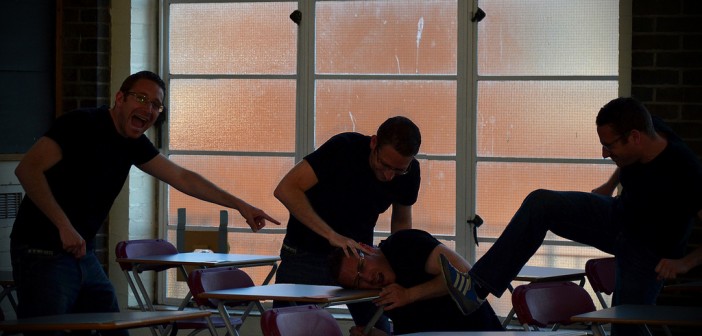 Chris Rees, "The Bully Boys" (2011) via
Flickr
Chris Rees, "The Bully Boys" (2011) via
Flickr
I went to school in the 1950’s and 60’s. Occasionally, you would go home and tell your parents about something unfortunate happening to you at school like being teased and picked on by another student. I think back then the expectation was just to “tough it out.” My mother would tell us, “Oh, just offer it up for the poor souls in Purgatory!” She had nine children, she recognized that teasing and getting picked on happened with children in her own family. In her mind it was part of growing up.
Not realizing it at the time, one of the many advantages of attending Catholic schools was being taught valuable lessons about behaving with kindness towards others. If our teachers observed negative behavior or learned of it, parents would be called and kids would suffer consequences for doing this. For example, you were kept after school in detention if your behavior crossed the line or you participated by not saying anything. Sometimes you would get a scolding for something you did or said to make the situation worse. You could even be expelled from school if you participated in cruelty to another child. From what I’ve learned recently, it appears we were living in the “good old days.”
Today when we read about this problem, aggressive behavior in children appears to have become more common and far worse. My friends that are teachers tell me it’s a problem that’s become extremely difficult to control.
This aggressive behavior is now referred to as “bullying.” So, let’s examine what this is and see if anything can be done to change the direction of this issue. The definition of bullying is: “Unwanted aggressive behavior among school aged children that involves a real or perceived power imbalance. The behavior is repeated or has potential to be repeated over time. It includes making threats, spreading rumors, attacking someone physically or verbally or excluding someone from a group.”
With the aid of the internet and social media, it can blow up so huge that it has repercussions for a child that can be catastrophic. Some of these children are forced to leave the school they are attending because they feel powerless to change it, even with the aid of their parents. Some have even taken their own lives. This seems appalling to me. I’m so sad when I read about children who have experienced this. I recently read a blog designed for kids to share their bullying stories. After reading this it occurred to me that there has to be something done to change this situation with our kids and grandkids? But how do we go about changing something so prevalent in schools. To help understand this better, I thought I would summarize some of the things I’ve read that we could begin doing to impact change.
First: Communication – Let kids know how seriously we take bullying. Showing sympathy and concern and reassurance is important to get them to open up about what’s going on. You can then determine if it’s bullying or worse. Have they told their teacher? Do they know what to do if it occurs?
Second: Look for signs especially if they are not communicators: Problems with eating and sleeping; headaches, decline in school interests, reluctance to join in activities, bruises and scratches, loss of friends.
Third: Bullied children need to ask for help and learn to stand up for themselves! Encourage children who feel bullied to say “no”, or “go away”, or “that’s not funny”; essentially speak up for themselves. Depending on the gravity of a situation, they should actually walk away. If the situation becomes unsafe, it’s important that they ask an adult for help.
Fourth: If a child is actually observing this behavior they need to know they have the power to put an end to it. They need to make sure they won’t laugh or participate in harassing someone being bullied. It’s ok to say “stop teasing,” “stop hurting,” or “leave him alone.”
I’m sure this is only the tip of the iceberg. Remember there is also cyberbullying. This is worse since it has far-reaching consequences. I read one story about a woman cyberbullying a friend of her daughter because her daughter's friend began dating her daughter’s boyfriend. It’s amazing to me that things like this happen with children, let alone an adult's participating in hurtful bullying.
I often imagine myself being in a position of impacting a major change to a problem as big as this one. The first step toward change I know is admitting the problem and becoming aware of how to help the situation improve. I know my friends that are teachers are shocked about how big a problem this has become. They feel overwhelmed by the problem. They would welcome help from everyone who would be willing to attend parent/teacher meetings and offer suggestions to help improve this situation.
7 Keys To Life (Day Star)
1) God First
2) Love One Another
3) Never hate
4) Give Generously
5) Live Simply
6) Forgive Quickly
7) Be Kind Always
I would think that if everyone in every child’s life including teachers, parents, grandparents, aunts and uncles and friends stood up to bullying prevention, we could eventually overcome this problem. We can certainly continue to offer up our challenges we face in life for “the poor souls in purgatory.” Unfortunately, I think in this instance it requires more! We need to all stand up and speak out for children!
Copyright 2015 Catherine Mendenhall-Baugh.
Photo by Chris Rees, "The Bully Boys" (2011) via Flickr. All rights reserved.
About the Author

Catherine Mendenhall-Baugh
Catherine Mendenhall-Baugh (Cathy) completed her education in Special Education and English and now works as an Agent in the Insurance Industry. A mother and Grandmother, Cathy grew up in a large Catholic family and has spent the last 30 years as a caregiver for her husband, Jack. She is a cancer survivor, which inspired her to begin writing.


.png?width=1806&height=731&name=CatholicMom_hcfm_logo1_pos_871c_2728c%20(002).png)
Comments